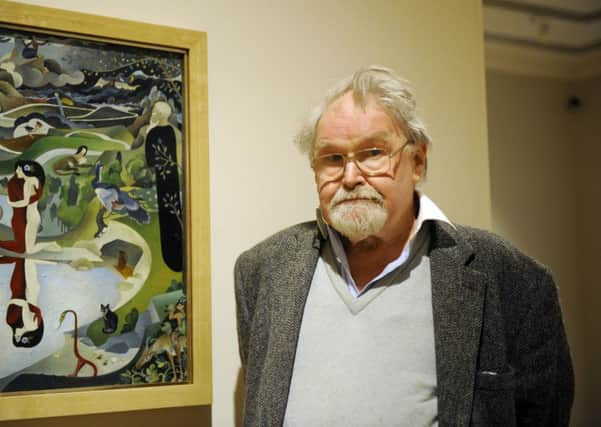Book reviews: Alasdair Gray | Scotland’s Choice


Independence: An Argument for More Home Rule by Alasdair Gray
Canongate, 128pp, £9.99
Small nations in a big world by Michael Keating and Malcolm Harvey
Luath, 152pp, £9.99
Advertisement
Hide AdScotland’s Choice: The Referendum and What Happens Afterwards by Iain McLean, Jim Gallagher and Guy Lodge
EUP, 256pp, £12.99
Gray does not hide his preferences. They are presented in the title and in passionate statements throughout the book. In his own words, “the ray of hope is a Scottish government as separate from UK war plans as New Zealand, Holland or Norway”.
This is a nice soundbite but it is sadly not well informed: as Gray ought to have known, the Dutch government actually did support the Iraq war (though, a commission headed by a judge later found that their government had acted in contravention of international law).
And here is the single biggest problem with Gray’s volume. It is written with equal doses of poetry and panache, but also with that element of populism that otherworldly intellectuals mistake for profundity. That said, the book is witty and entertaining. There are some omissions in his historical analysis and the view of John Knox – who is portrayed as an early advocate of free university tuition – is too rosy.
The other books under review are less witty – and nor are they intended to be. Mclean, Gallagher and Lodge’s book is the second edition of a very thorough volume. One of the authors, Jim Gallagher, is close to the Better Together campaign. To some people, this may compromise the book, but I don’t see why – the authors are open about the affiliation.
The book is, on the whole, a thorough, decent and informed account of what might happen in the event of a Yes vote. The book analyses the rules about EU membership and finds, on balance, that Scotland would not automatically be able to stay a member. Throughout, the explanations are sober and the authors analyse rather than postulate.
Advertisement
Hide AdOne of the most interesting aspects of the book is the analysis of the Scotland Act, which will come into place in the event of a No vote on 18 September. Under the Scotland Act there will be substantially more devolution and, apparently, the Scottish Parliament will move from raising 15 per cent of its revenue to approximately 35 per cent. That sounds like a lot – though the negotiations between the three main parties in the No campaign might even deliver more – and as a result the authors imply that a No-vote will effectively lead to devo-max.
The other way of looking at things is to stress that 35 per cent isn’t that much. In Denmark, to take one example, 31 per cent of the tax revenue is raised by local government. In other words, in the event of a No vote all the Scots can be sure of – because we still don’t know how the inter-party talks on the No side will end up – getting is a parliament with the same taxation powers as local government in Scotland’s eastern neighbour.
Advertisement
Hide AdMichael Keating and Malcolm Harvey’s book is erudite and well-researched and is one of the best I have read this year. The main recommendation of Small Nations in a Big World is that it provides solid facts about different ways in which small states like Scotland, Ireland, the Baltic and the Scandinavian countries actually work. Given that the SNP want to model independence on the Nordic welfare states, it is interesting to see how this model has fared.
Keating and Harvey write: “In the wake of the global financial crisis of 2008, neo-liberal states tended toward austerity measures to reduce government spending. Nordic states did the opposite.” This may sound like manna from heaven for those who are tired of George Osborne and complain about the so-called “bedroom tax”. Of course, we do not yet know how these Nordic countries have fared, and by implication how Scotland would fare if she were to pursue the same strategy.
Keating and Harvey concede that the crisis “placed a significant strain upon the Nordic model”. However, before the Tories among readers break out in a collective fit of schadenfreude, it is worth noting Keating and Harvey’s overall verdict on the Nordic model. They write: “Since the turn of the millennium, the Nordic economies have been on an upward trajectory, leaving their citizens wealthier year on year.” That the Nordic model thus is a viable alternative puts into focus the choice facing the Scots on 18 September. It is – if we are to trust Keating and Harvey’s analysis – a choice between a Nordic welfare state and a variation of the status quo with a Scottish parliament with few tax-varying powers.
Some voters complain that they do not have enough information to make a decision. All these books provide a welter of facts – and some strong opinions. Of the more that 20 referendums this reviewer has studied, none has provided the voters with more information than this one. Whatever the result, it will be a well-informed decision.